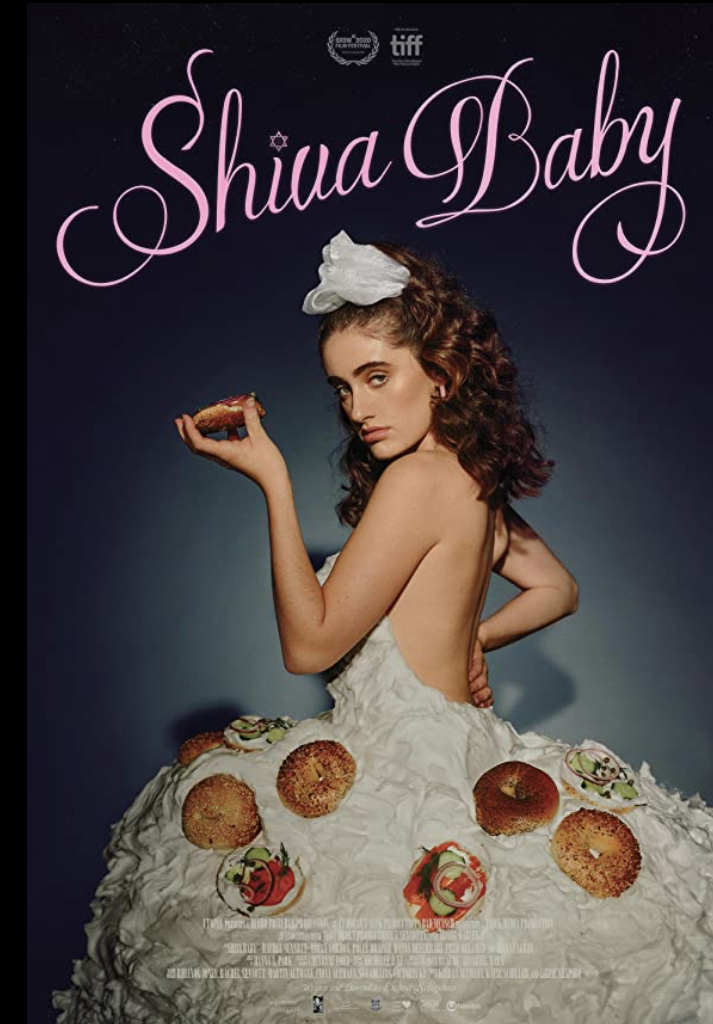
c/o imdb.com
When I was growing up, it was rare to see any representation of Jewish life in America in popular TV shows or films. While I knew that being Jewish wasn’t abnormal where I grew up in Washington, D.C., it’s not as if any of my favorite Disney characters were celebrating Hanukkah or fasting on Yom Kippur. Never had I seen a Passover Seder on Nickelodeon, and never did I ever believe I would see a Shiva in mainstream media. This all changed when I watched “Shiva Baby” for class this past month, a 77-minute movie that came out on April 2nd. Produced, directed, and written by Emma Seligman, “Shiva Baby” is about an undergraduate student who becomes trapped at a Jewish funeral with her ex-girlfriend and current sugar daddy.
In the Ashkenazi Jewish tradition, a Shiva is a seven-day event after a funeral in which family and friends can come and pay their respects to the deceased, sharing stories, food, and gossip. The movie centers on Danielle (Rachel Sennott), an NYU student finishing up her final semester and unsure of what her next move will be. She’s young, queer, and sexually desirable, a trait that is often not ascribed to Jewish women in film and television. After reluctantly agreeing to join her parents at a Shiva in the suburbs, she finds herself embroiled in every young Jew’s nightmare: trapped in a small space where everyone you know is talking about you.
Dubbed a new type of “horror film,” the movie is a testament to the nervousness and angst that seems to follow Jewish characters. The movie plays to the stereotypes that often plague Ashkenazi American Jews: heightened anxiety, concerns about food and weight, the over-involvement of parents in the lives of their children. I especially appreciated the mix of tight shots and creepy Klezmer music to reinforce the claustrophobic feel of the space and Danielle’s deteriorating mental state as the movie progressed. Though these experiences are not true to each and every Jew, they felt incredibly familiar to me as I watched the film. While a non-Jewish viewer would be able to watch the movie and still feel the palpable tension between the characters as they move through the Shiva, for this particular Jewish viewer, the stressful feelings were all too real. Before “Shiva Baby,” I had never watched a character on-screen to whom I was able to relate so much.
Despite “Shiva Baby” being such a quintessential Jewish film, the actress that plays Danielle, Rachel Sennott, is not Jewish herself. While talented actors are obviously able to play the roles that they are assigned, it feels to me as though Seligman and casting director (for the 2018 original short film) Katie Schiller missed the mark in choosing not to cast an actual queer, Jewish woman in the role. For many young Jewish women, such as myself, “Shiva Baby” will be one of the first movies that they see that feels as though their experiences are being recognized in a way that isn’t tokenizing or offensive, but rather a celebration and recognition of the unique circumstances that are growing up Jewish in America. Ironically, the “Shiksa” character (a not-nice name for a non-Jewish woman), is played by Dianna Agron, aptly named “Kim” (perhaps one of the WASPiest names Seligman could think of). Agron, known for her blonde hair and WASP-y charm, actually is Jewish, though she had never been cast in a Jewish movie before “Shiva Baby.”
Ultimately, “Shiva Baby” is a testament to the American Ashkenazi experience, and watching characters that feel relatable on a cultural level was a different and validating experience. I would certainly recommend it for anyone looking to watch a modern interpretation of Jewish culture, or for Jewish women just wanting to be seen beyond characters like Rachel Berry.
Talia Zitner can be reached at tzitner@wesleyan.edu and on Instagram @yagirltal.